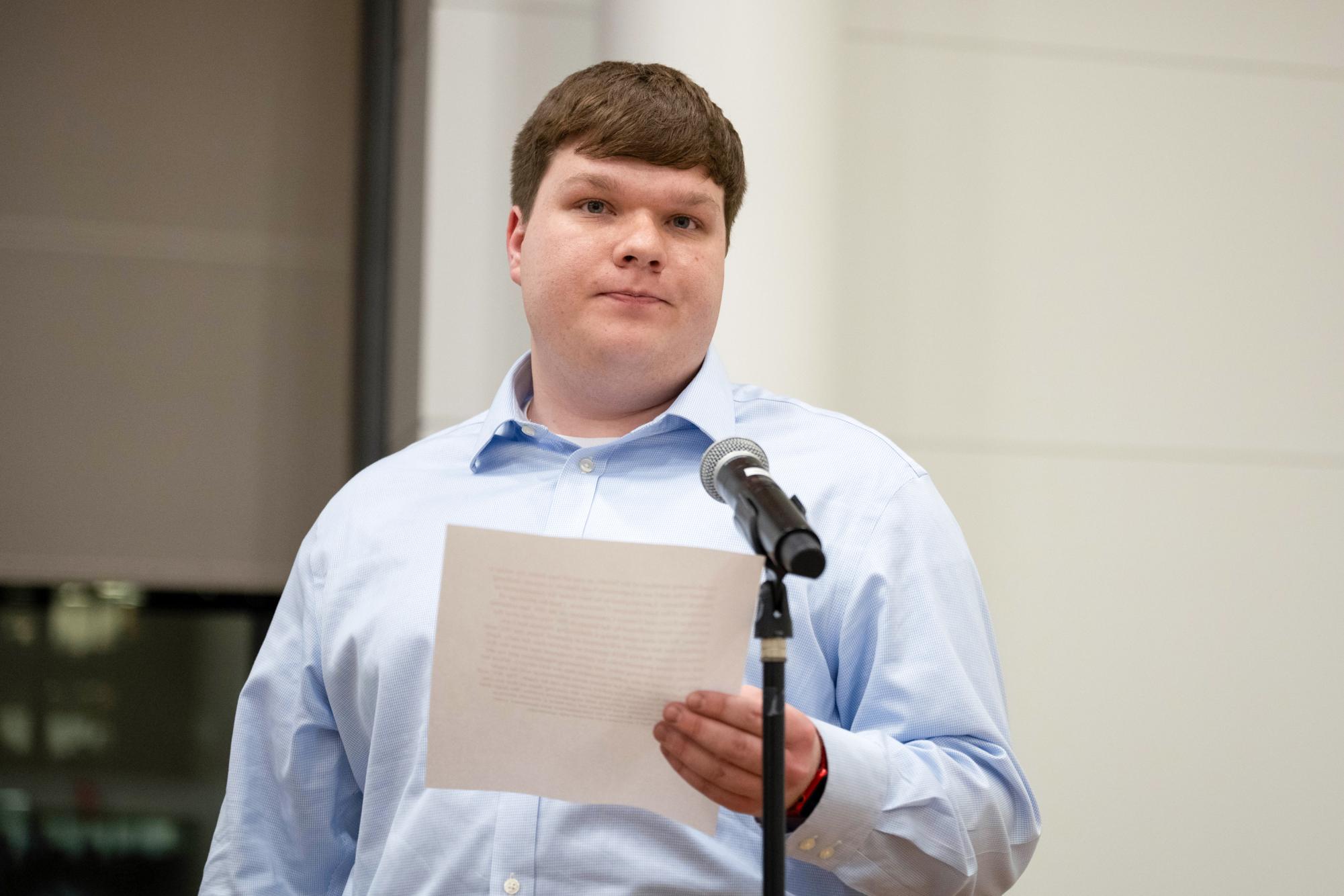Violation hearings and threats of disqualification in the past three student government elections pushed the Joint Elections Commission to adopt a “no mercy” approach to penalizing candidates who violate campaign rules in this year’s race.
One day after Student Government Association presidential candidate Ethan Lynne pleaded guilty to campaigning in a restricted zone, JEC Chair Michael Ubis announced that the regulatory body will investigate every accusation of campaign violations to the “fullest extent.” Ubis said the JEC will now proactively “try and get” evidence to substantiate allegations of candidates’ campaign violations to avoid waiting for the filing of a complaint and risk forgoing the punishment of guilty candidates.
Here is everything you need to know about the JEC ahead of this week’s election:
A history of disqualification threats leads to stricter policies
In 2023, the Joint Elections Commission disqualified SGA President Christian Zidouemba from his campaign for a second term due to wrongfully collecting signatures and impersonating other candidates.
In 2024, the JEC almost disqualified SGA presidential candidate Dan Saleem for securing endorsements before the start of the campaign period. The JEC initially gave Saleem six penalty points, enough for disqualification, before revoking one count and allowing him to continue his presidential bid.
Ahead of the 2025 SGA elections, an authorized agent — an individual registered to act on a candidate’s behalf in conducting campaign activities — for presidential contender Ethan Lynne pleaded guilty to five counts of collecting signatures in an unauthorized zone, one point away from disqualification.
In all three cases, the JEC received complaints with photographic or other documented evidence of the candidates violating signature and restricted zone regulations, resulting in their guilty sentences.
On March 24, the day after Lynne’s hearing for restricted zone violations, the JEC wrote an email to all of this year’s SGA candidates, stating their pursuance of a “zero-tolerance policy” toward restricted zone violations.
Ubis said that before the statement, there were “a lot of people” violating restricted zones that he was aware of, but the violations weren’t documented in a formal complaint, which meant he lacked the evidence to conduct a formal investigation.
The JEC will now “go further” for every filed complaint to find any evidence to launch an investigation and penalize candidates for violating JEC regulations, he said.
“There is not going to be any excuse that you’re going to be able to give us that’s going to make us think that we shouldn’t assess penalty points or that there was a reason you violated the restricted zone,” Ubis said.
Lynne said he believes the policy crackdown was a “direct result” of his campaign violation in March. A lot of the JEC bylaws could be “better publicized” to limit violations close to the election, he said.
“As with always, everything can use clarification because I think a lot of stuff within the policies are very overly broad,” Lynne said.
Saleem, who launched his second-consecutive bid for SGA president last month, said restricted zone violations are the “most common way” for candidates to rack up penalty points because of the “ambiguity” of the locations permitted for campaigning, citing his own confusion with what qualifies as an “academic building.”
The 2025 restricted campaign zones for candidates include academic buildings, dining halls and residences, according to the JEC website. The zone regulations are consistent with last year, except for new restrictions on “dorm storming,” or any campaigning in residence halls.
Saleem said he would appreciate “clearer” guidelines about where to campaign before the start of the official campaign period so candidates can avoid disqualification. He said it is “hard” to decipher what qualifies as as permitted campaigning zone, per the JEC bylaws, which he said potentially led to an increase in violations this year.
“We have reached out to the JEC many times to clarify that, but I think that what was happening was people were taking advantage of the ambiguity of that,” Saleem said.
A brief history of JEC restructuring
In February, the JEC merged its three committees — one handling the election, the second enforcing election laws and the third addressing campaign violation hearings — back into one after Ubis said JEC commissioners struggled to coordinate with each branch under the three-committee structure.
Under the three-committee system, campaign violations required three hearings before the JEC was able to make a decision about the case — a probable cause hearing, an initial merits hearing and a violation hearing.
The SGA called for a restructure of the JEC in 2023 in response to the disqualification of Zidouemba, when his campaign violations led to JEC commissioners appearing in student court for three cases, Ubis said.
He said the JEC’s structural change aimed to expand due process — citing SGA concerns that the body needed to be more “objective” by adding a judicial branch — but that he was “never really a supporter” of the switch because it increased the body’s “bureaucracy” by requiring it to recruit more members than were interested in joining.
The JEC reverted to its initial structure this February after conducting last year’s election under the three-branch system.
Ubis said it is now easier for the JEC to administer penalties because the switch eliminated the initial merits hearing, meaning candidates have to attend fewer hearings before adjudication of their case.
“It simplified the system, and I don’t think it removed any due process protections,” Ubis said.
JEC Vice Chair Edward Kemelmakher, who has served on the commission for two years, said the SGA “forced” the three-branch system onto the JEC and none of the commissioners were “very happy” with the change.
“Communication was a lot slower because of the structure of the JEC, the commissions weren’t really allowed to talk to each other as easily, and that made it really hard for us to get anything done,” Kemelmakher said.
Saleem said the single-branch committee system has improved the efficiency of the JEC’s communication with candidates this election cycle.
“That has been very helpful to our campaign this year, and I would say all campaigns this year,” Saleem said. “I would also say that the JEC is far more, in a way, they’re all in the loop.”
JEC struggles with staffing
The JEC consists of six commissioners, which the SGA president confirms with “advice and consent” from existing commissioners, according to JEC bylaws. Ubis said it is an “expectation” that the SGA president confirms any commissioner nominations that the JEC brings forward.
Ubis said he was responsible for finding people to fill the JEC’s five open positions this year following an unsuccessful attempt to advertise open roles. The three-branch structure required the JEC to recruit eight total members, while the single branch only requires five.
“We did have quite a long application process for people to express interest in joining the JEC that started way back at the end of September. I believe we received two applications, and there’s five positions we have to fill on the JEC, so obviously not ideal,” Ubis said.
Because the JEC is “stressful” and “low reward,” Ubis has had to beg his “good friend” Kemelmakher to join the commission for the past two years, he said.
He said he also filled the remaining four commissioner spots with his friends, who he said are “not super well-versed” in JEC regulations. Ubis said he is not concerned about conflicts of interest among the JEC because he believes all his friends are “independent thinkers.”
“Nobody else wanted to apply, and we have to have people on there to help me, so obviously, I didn’t want this either,” Ubis said.
JEC Commissioners Rohan Singh and Kenan Orlovic did not return request for comment on their role on the JEC and how they delegate violations to candidates. Commissioners Tanim Miah and Genesis Lukasiewicz declined to comment.
Molly St. Clair contributed reporting.














